#KNOW if an entire Iterator or even just the puppet showed up in the system and there has been no sightings or suspicions nada. so that is
Explore tagged Tumblr posts
Text
ok chat here's the issue. (Troubling Red) Phenomena and Parades (of Nightmare Carousels) ended up a couple on accident (in the meta sense, also don't ask how it's as mysterious as one of our OCs becoming transfeminine over the course of 5 months of not thinking about her) and we are struggling with the ship-name. one thing we quickly noted is that this fandom has more symbolism/theme ship-names over name mash ship-names, and we've not made themed ship-names in forever. anyone willing to help. we know we have the symbolism braincell because years ago we made techbugs as a polytriad name for another OC ship but also. we are sooo stumped for these funny guys (gender varied)
#sometimes we wonder if sudden OC detail changes are bc of system trickery but while it was possible for Jade (transfem OC mentioned) we'd#KNOW if an entire Iterator or even just the puppet showed up in the system and there has been no sightings or suspicions nada. so that is#ruled out. plus Pheno and Parades are both OCs of just one headmate (in terms of story control)#hounds oc ramblings#oc: parades of nightare carousels#oc: troubling red phenomena#ok reach tags sorry if you dont want to see posts like this in the tags#rainworld oc#rain world oc#rw oc#iterator oc#rain world#rainworld#rw shipping#rwshipping
0 notes
Text
I was trying to write out my thoughts about Homura and Walpurgisnacht's relationship, but I think what best encapsulates them at the moment is actually an image: the M.C. Escher lithograph Drawing Hands (1948).

Drawing Hands is first and foremost a paradox, with each hand rising out of a two-dimensional world to create the other and no beginning or end. In his book Godel, Escher, Bach: An Essential Golden Braid, Douglas Hofsteader uses it to represent the concept of a strange loop: a system (like consciousness or a musical fugue) that moves through multiple iterations, only to finally return to its starting point.
I first encounter this image juxtaposed with the Jorge Luis Borges micro-story, "Borges and I", which is--among many other things--a doppelganger story dealing with questions of identity and the boundaries between one person and another. The story ends with a confession: "I do not know which of us has written this page." The question that I ask now is, does it even matter? Is it truly either/or, or both/and?
The story of Madoka Magica is ultimately circular in nature. This is true of individual installments (here taking the anime episodes collectively as a unit), and I suspect it will ultimately be true on a collective level as well. I fully expect that the last shot of the final installment--whether Walpurgis no Kaiten or some other sequel--to end with the same imagery we saw in the "Prologue in Heaven" that opens the first episode of the anime. The end is the beginning is the end is the beginning--except that everything has changed as a result of the story that has been told; we now have the fully context to appreciate it for what it was all along.
In the anime, Walpurgisnacht created Homura by showing up in that first timeline and killing Madoka, thus inspiring Homura to make a contract and become a magical girl to save her. Thus it would be narratively fitting if Homura's actions--whether directly or indirectly, intentional or unintentional--lead to the creation of Walpurgisnacht, each of them giving rise to the other in turn.
After all, this is the same relationship between magical girls and witches in general--one creates the other in a never-ending loop, at least until Madoka wishes to change the cycle. Even here, the cycle remains a cycle--as evidenced by the name "Law of Cycles": the nature of the loop changes but not its structure.





The shape created by the hands in Drawing Hands is eerily reminiscent of the twofold tomoe, a Shinto symbol composed of two looping swirls, which itself is similar to the Chinese ying and yang symbol. A similar design appears in both Walpurgisnacht's mandala and Homura's shield--just as they are united in their shared motifs of cogs and gears, they are also linked by their connections to the cycle of creation and destruction.
Drawing Hands is also a good metaphor for Madoka Magica in that it involves transcending two dimensions, just as Madoka Magica's animation incorporates three-dimensional objects on a regular basis. It also suggests at the possibility of a world outside of the narrative presented in the story, that everything we've witnessed on screen is in fact a tale unfolding in-universe as well. It's also an excellent metaphor for Rebellion in particular, which explicitly incorporates Homura's floating hands ("blue-screened" to indicate they are visible only to the audience) actively puppeting the Nightmares and building the "stage" in her labyrinth upon which the entire psychodrama takes place.
Oh, and I'd be lying if Drawing Hands didn't make me think of this shot from the original series, too, although both the position and the underlying symbolism are different:

(something something Madoka's wish to save all magical girls with her own hands something something--look, there's a lot of hand imagery in this show, okay?)
That said, given Homura's salamander/lizard motif, perhaps a different M.C. Escher drawing, Reptiles (1943) will prove to be an equally fitting representation of her journey in the end.

We've already seen the salamander representing the "Dark Orb" move from two to three dimensions (and become a phone!) in the trailer for Walpurgis no Kaiten, so who knows what the movie has in store for us?
52 notes
·
View notes
Note
Hey, are you up for receiving an entire freaking essay about how you write Dirk and how fucking incredible it is? That was a rhetorical question, YOU'RE GETTING IT ANYWAY.
So. Dirk Strider. The absolute moron who sends himself back every iteration, gets increasingly splintered as a result, and is way too emotionally compromised to do anything about it at this point. I've noticed a lot of the characters draw inspiration from beyond canon, so we can refer to this Dirk as a sort of Ultimate self if I am not mistaken. The guy has memories from all past iterations rattling around his skull after all, and it is MESSING HIM UP BIG TIME!
Like, the man is going by a script at this point. Do this, and this happens as a result. Say this to a person and they'll react that way. Let Roxy leave so you can stay with Dave alone, stab him in the back, and leave him for dead so he gets off the empire's radar, make sure he doesn't actually bite it, and then he'll end up in the position most advantageous to him. He has a ship! A crew! A small support system! He's living his best life this iteration, and he has DIRK to thank for that! Never mind that most of his relationships were completely destroyed in the fallout. Never mind that he has accumulated major trauma from the carapacian war, and was betrayed by someone who he thought he could count on for anything, that's not important. Oh yeah, he hates Dirk's guts now, but he always calculated with that loss. He sacrificed his brother's trust in him and it sucks, it sucks and nobody understands, but it was to give him a happy life, so at the end of the day Dirk's the selfless hero!
And with that, I've accumulated my thoughts on what I think went through his head when he went through with this batshit awful plan. Dirk's literally so wrapped up in himself, that he can only think in terms of other's gain versus personal cost. I don't think he's selfish, no, from a certain perspective, he's far from it, because he's sacrificing the few things he holds dear for the few people he actually gives a shit about in all these loops. His relationships with said people. It's just that he is INCAPABLE of seeing how his decisions and attempts at helping them cause more pain and anguish, and eventually, the doom of the timeline. It's like at one point, he stopped seeing them as real people, with psyches that can be damaged, and feelings that can be things beyond 'I hate you now because you hurt me', and instead thinks of them as merely... puppets.
Because he's the only one who remembers. He's the one who can see the bigger picture, while his friends and family are caught up in the mundanity of each loop, living lesser lives, being lesser people. If only they knew, if only they understood like him, maybe they could be on equal footing, but no, he'd never wish this existence on anyone, and besides, even if they had all that intel they'd never really get it, because they aren't him. So it falls on him to save everyone, him and only him, no Grimmage, just because you have a handy helmet that spouts bullshit about the loops at you does not mean you have all the answers. This is Dirk's mission, Sollux would just fuck it up. Everybody needs to stay out of the goddamn way, you're saving this goddamn timeline. All those previous ones you doomed? They were just test runs, you know what you're doing now.
I just... LOVE how AUTHENTIC he feels in your fic. Like, I look at this guy and say 'Ah yes, that right there is textbook Dirk Strider behavior,' but you wrote him with motivations and a mindset that I can see combined with his Ultimate status. He's an incredible antagonist, and I can't wait for him to show up again, because I need Dave to go up to this guy and somehow slap some sense into him. Unlikely but hey. I want a happy ending for him too, let me hope.
Okay, first of all, I loved this ask! I've put a lot of time and effort into writing Gold Pilot so if anyone has other essay-length asks or comments about the fic, go ahead and submit them, this monster AU deserves the attention. For anyone who hasn't read the fic, it's a Davesolkat Rebellion/Time Loop Au but it also will go deep into the other characters as well, particularly the Strider-Lalondes, so if you're into that, give it a read!
Okay, now onto Dirk- he's one of my fav characters in Homestuck okay, he's so complex! And I felt like they did him dirty in Beyond Canon and the Epilogues but at the same time they explored some hella interesting aspects of his character that have been in the main comic there all along, same with everyone else. Gold Pilot is MY take on how everyone's true 'Ultimate Self' would work and also them reaching their 'fullest potential' in a way? The situation is much different than in canon, of course, but overall I will try to deconstruct both, the Ultimate Self thing AND the classpect of their God Tier selves. This will happen to everyone, not just Davesolkat, though we WILL focus on those three because I have Davesolkat brainrot and Dave WILL be the only POV character because ‘unreliable narrator who might not have an idea of what’s going on’ is the best trope.
But Dirk- it's funny that you call him an antagonist because he's not that in the story. An antagonist opposes the hero/protagonist in some way, they're there as an obstacle to achieve their ultimate goal, but here's the thing, Dirk WANTS what everyone else wants. He wants an end to the Time Loops, he wants to protect his family and friends and help them reach the best version of themselves, and he also wants to kill the Condesce. Mainly because she's the one who kills Dave, Roxy and Rose, but also, because he recognizes that she's the TRUE threat in this AU (as far as we know). So no, technically, Dirk ISN'T the villain and he's helping everyone else fullfill their own goals, the role they will play in the Rebellion as it is, and he knows full well that they WON'T achieve that unless he's there to provide support.
You're right that he's sacrificing everything else to achieve this. He sacrificed Dave's trust on him, and Dave IS in probably the best position he can be because of it. Does Dave realize this at this point of the story? Probably not. There's hints that Dirk's actually going to be working with them further in on the timeline, but right now? Right now Dave thinks his brother is the person who ruined his life.
You're right in saying that Dirk's so completely wrapped up in himself, but I don't think he's incapable of seeing how his attempts at helping everyone are actually hurting them. I think he's well aware of this, and a part of him is well-aware that none of them will ever forgive him, but he's fine with this because this makes him an even more selfless hero. He does treat them as puppets, but I think he knows that he NEEDS them to be certain versions of themselves so they can properly fight the Condesce. Also, he's aware that even in this, they have a certain level of personal choice. Would he have been forced to stab Dave on the back if he HADN'T become a Treschutioner? We know Dave could have become an entertainer guy instead, and he would have STILL ended up with the Rebels. We've explored this with the Iteration Logs of the Solluxes, but the timelines are less a straight road where everything always happens the same way and more a collection of choices that give out wildly different results while still ending in the same way any way because the Condesce is such a menace, with everyone dead.
And he's another fun thing, Dirk doesn't ACTUALLY know about the helmet. Sollux has specifically kept him in the dark about it because he's convinced Dirk would exploit it if he knew about it, especially because the helmet's not only a device that spouts info about the timeloops. It's a goddamn database containing the research that EVERYONE Sollux has been able to contact has done in the past, what? 286 years or so. So yes, it's quite a powerful tool, but you're right, Mage doesn't have all the answers. And you can say that Mage's actually some kind of cheat code. It allows Sollux to have access to the memories of the loops WITHOUT all the trauma and emotional baggage that come with them, so if anything, I suppose that Dirk would think of it as the coward's way out.
Sollux quite literally decided to divide himself into two different people (or as different as two people can be when one does have all the memories of the other one) and has basically locked the part of himself that DOES remember in a digital prison/dimension, where it cannot harm anyone or control anyone else. What this has done to Mage, well, I think we’ve seen it already, so yes, one could argue that this is an incredibly selfish thing that Sollux did, meanwhile Dirk isn’t afraid to live with the consequences of his own actions, which automatically makes him the better man/hero.
As far as Dirk knows, Sollux DOES remember, he's just, you know, someone who will not do what is necessary to save the timeline. He's soft, he spends so much time trying to get along with everyone that he allows the people he loves to get killed every single time (though Dirk's doing the exact same thing, one could argue). They're more foils to each other that they're enemies, and it will be a lot of fun once we actually see them interact, because while Dirk does think Sollux is as easily manipulated as everyone else, and that he doesn't have what it takes to save everyone which is why it falls on HIM, Dirk does know that Sollux is the only person who knows him in a way. Who can recognize the sacrifice he's making and just what's at stake here, if he doesn't take exactly the same path he's taken every time to ensure everyone will be able to fight for as long as they can.
You're right on the money on the 'Dirk thinking all the other iterations are test runs for the real deal', because Dirk HAS found pretty much the 'best path' for everyone to take. We'll see more of it when we meet Rose, who IS still a very powerful seer in this AU and who also takes after him in a way, but yeah, the fantastic thing about Dirk is that he IS helping everyone and he does care. He's on Dave's side. He just, you know, also Dirk. That's why I've always found fascinating about his character, and what I liked about him in the actual comic. I feel like Beyond Canon let go of that fundamental part of him (the fact that he DOES care) and I'm using Gold Pilot to basically fix that? Basically how I think it should've been handled.
As for the happy ending- I don't think it's much of a spoiler that Gold Pilot WILL have one, because it's in the tags themselves lmao. 'Earn Your Happy Ending', they will get there, but it will take them a long time, and it won't happen in this iteration even. Dave WILL slap some sense into Dirk, but who knows, maybe it'll be Dirk who slaps some sense into him too before he does.
Once again, thank you for this analysis! I wouldn't say I'm the authority on how to write any of the Homestuck Characters, but I'm glad I at least got Dirk's character right :) as I said, he's one of my faves and his relationship with Dave will be explored and milked for all of its angst and comfort in this fanfic.
#homestuck#hom3stuck#homestuck fanfic#dirk strider#sollux captor#dave strider#gold pilot au#alec answers
20 notes
·
View notes
Text
The Revue of Solitude & Re: Create, An In-Depth Analysis
Endlessly listening to Re: Create made me revisit the Revue of Solitude yet again. I picked up on a lot of details about the song itself, and how it interacts with the visuals we’re seeing in the anime. In this essay, I will be discussing themes regarding childhood, the use of fire & water in the sequence, symbolic motifs that are present, etc.
I'll have timestamps linked and screenshots attached to specific moments in the Revue. I even found a video that isolates Re: Create, so we can solely focus on the song & visuals (Credits to youtube user mint pepper!). I will be talking about the lyrics at times too, but I used @angelXind’s translations found on the /r/RevueStarlight page (credits to her too!). The video has Eng translations too, and I know both translator’s translations don’t exactly match word for word, but they’re close enough to get the same ideas across. And I know translating things to English can only go so far in really portraying the exact sentence’s meaning in its original language. We’ll just use what we have.
Let’s watch and listen closely to the whole revue, shall we? This analysis is very long (it’s almost 3k words don’t say I warned you...), but there is so much to unpack, guys. I hope you enjoy my reading of it!
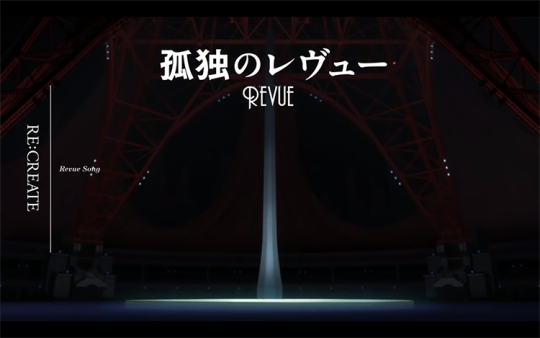
Right off the bat, there are two sounds I want to focus on: the violins and the piano(and/or xylophone?) keys.
(0:06) The Piano/Xylophone Keys as Lullaby Music They remind me of lullaby music because of the high pitch. The sound is reminiscent of times when everything was still pure and innocent, and not tainted by how harsh reality is. This sound comes and goes a couple of times, and is mostly in the background, being overpowered by the other instruments.
(I’d like to point out that I’m 100% sure the lullaby sounds are not just only piano keys. They might be xylophones at times or even chimes... or a triangle? Whatever they are—I’m calling them lullaby music.)
The lullaby music being in the background is representative of how Hikari is still warming up to the idea that she and Karen can be on the same stage together. These sounds are only completely audible when Hikari fully reflects about their promise, and begins believing in it. I’ll talk more about this later on.
(0:07) The Violin(s) as Fairytales This initial violin sound reminds me of fairytale music—yet another theme in relation to childhood. The violin(s) sound very “flowy”—as if you’re being surrounded by their magic.
We are all captivated with stories as kids, and for Hikari, that story was Starlight. She loved it so much that she showed it to Karen. And Karen loved it so much that she saw herself and Hikari in it; believing that they could perform the play. Kids love roleplaying characters from stories, and they took that seriously that Starlight inspired them to pursue theater.
Fairytale settings are also known for having an ideal world where anything is possible. And of course, as children, you believe that two people can indeed stand on the same stage. Until you grow up and realize that’s not how the system works after all.
(0:30) The synth(?) reminds me of an igniting fire—a huge symbol we’ll see later on.
(0:43)
This is for the promise we made
Hikari’s lines in the entire song are dedicated to Karen. Let that thought sit throughout this whole analysis.
(1:48) The synth sounds come back in full-force, as the stage is filled with fire.
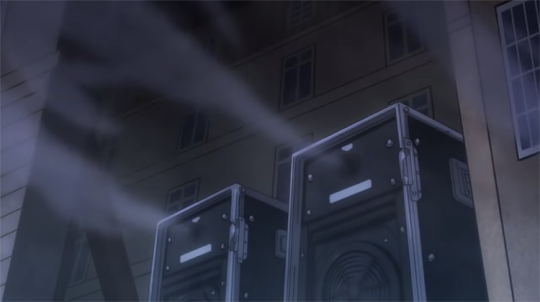
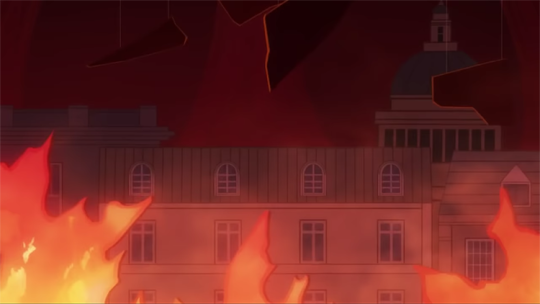
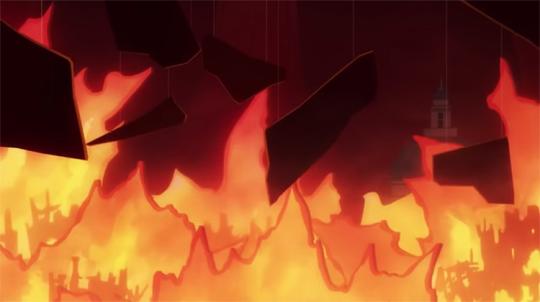
(1:57) Remember how I talked about that the lullaby sounds are just waiting to be heard, despite being in the background? This is one instance of it. In this part specifically, it sounds like it’s knocking on something. I would even say that’s indicative of how much the full memory between Hikari and Karen is just waiting to be explored.
(2:14) The lullaby-like keys are back, but they are in a more melancholic tone. They sound like they’re being defeated, and that is because Hikari’s stage is now filled with flames.

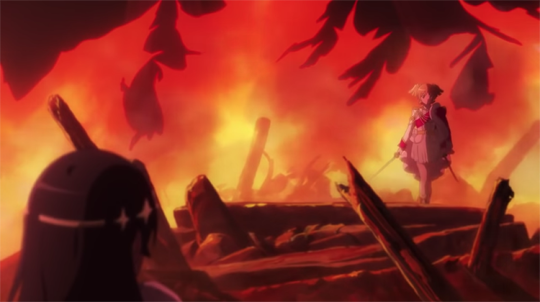
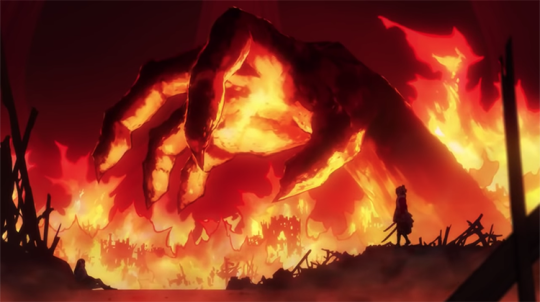
Fire as Passion, & Nana Nana wants to keep the flame of the Seisho’s 99th class’ Starlight play alive with her reenactments.
Fire as Rage, & Nana It is also a symbol of her rage towards Hikari, as her arrival broke the time loop. Hikari joining the auditions threw off Nana’s comfort zone. (Up until now, Nana thinks Hikari is the reason why things are changing—and not Karen—like we see her realize later on in EP9) And Nana has been trying so hard, in every iteration, to protect all their memories together. And with Hikari’s arrival, she has to deal with the possibility of leaving it all behind.
Fire as Destruction, & Nana Aside from Hikari disrupting Nana’s loops, the fire shows how destructive her own wish is to herself. She tells the giraffe that her ideal stage has become too radiant for her to reach, but is still convinced she’ll get it someday. And that thought has trapped her in an endless spiral for who knows how long—preventing her to move on and progress further.
Fire as Destruction, & Hikari Yes—fire is also a symbol of destruction for Hikari! It literally destroyed her stage!
The Fire and Grabbing Hand as the Top Star System First of all, let’s make it clear that Hikari’s stage represents her time London.
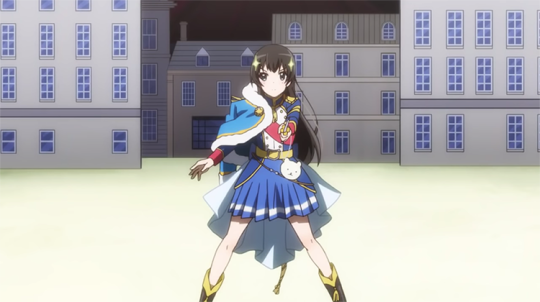
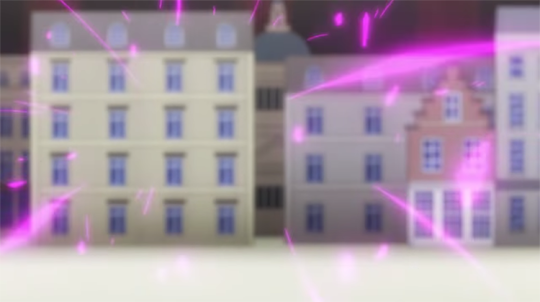
And more specifically, it’s the recital stage she performed on while she was at the Royal Academy for Theatrical Art.
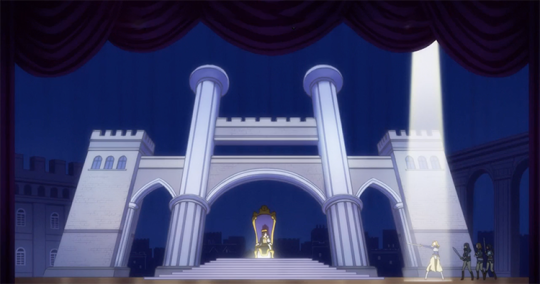
The very beginning of the Revue looked like this:
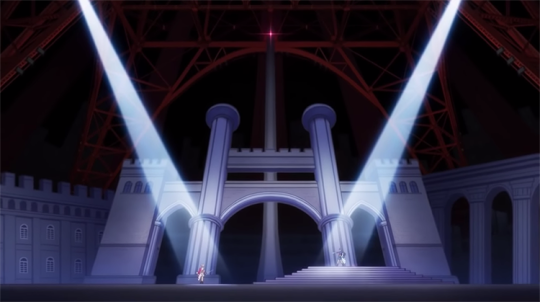
Hikari is standing on top of some steps, ready to challenge Nana. Her being on the higher plane indicates dominance and power, and she had that while she was still in London. She was so good that she got to perform in their auditions—until she lost. But before leaving, she was told, in the exact same setup during that recital, that “Someday, [she] will have to fight that thing”.
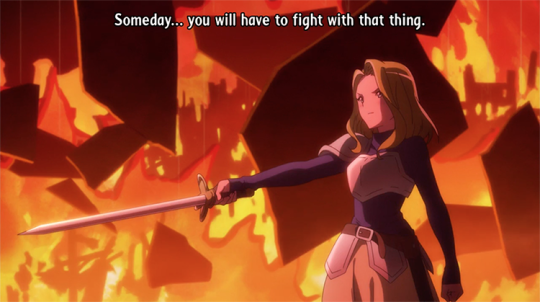
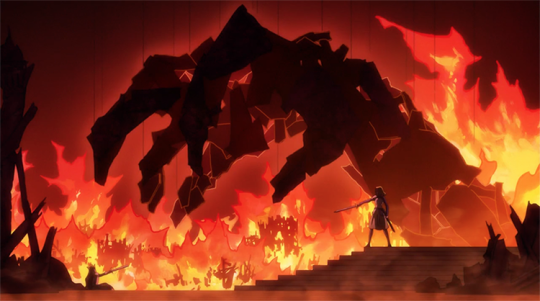
Which brings us back to where we are now:
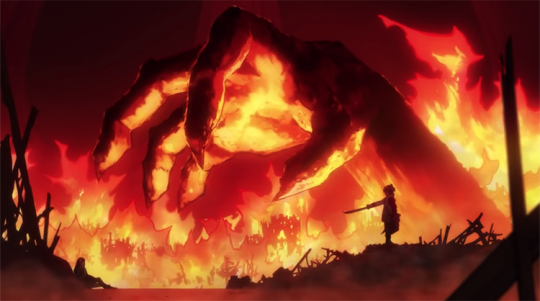
That “thing” could mean a lot of things, but one of my readings is that she has to face the reality of the Top Star system, and how destructive it is.
That system already destroyed her in London because she kept fighting in the auditions until she was just a pawn in their game. And when she was defeated, she lost all her motivation to become a stage girl. She realized how it feels like when the system makes a puppet out of you, and what happens if your brilliance as a star gets taken away. And that is all being mirrored by how wrecked her stage is right now.
The huge grabbing hand, along with the fire, emphasizes how powerful and controlling that system can be. We even get a sense of its massive scale in comparison their bodies. And see how it also has long, pointy fingernails? Remember in fairytales, how the villains always have those kinds of hands? Yup!
Nana is the one standing on a higher plane now, and the daunting hand is on her side of the stage, while Hikari is completely backed down to the ground. Nana clings onto destructive this system so much, that in this moment, her character represents it. Earlier in the Revue, Nana says, “You’re one of us now” to her. Hikari may have gone far in the London auditions, but she was back to square one in Seisho’s. Her weapon was even reduced from an actual sword to just a dagger.
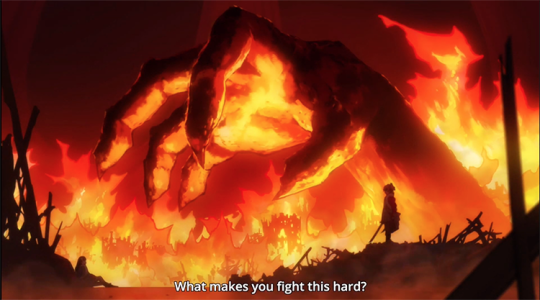
(2:28) Hikari is prompted in answering this question. And it seems very intimidating to tell this daunting stage that you and your friend made a promise to do Starlight together.
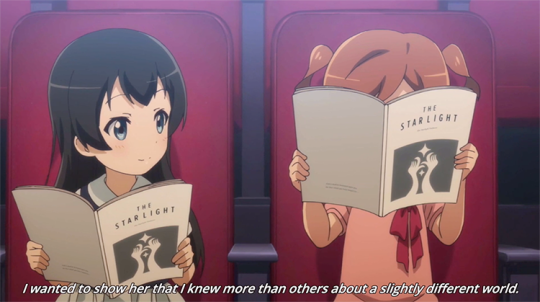

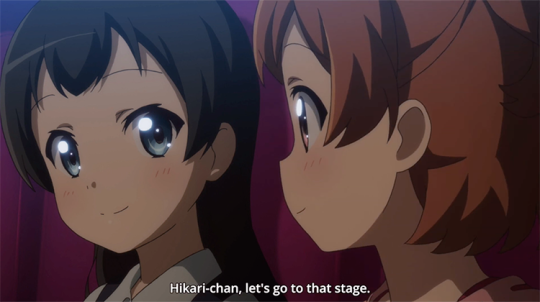

(2:40) Lullaby Music as Comfort But moments after, Hikari finally starts to face this fear. Once she begins to tell the whole story about how much Starlight means to her and Karen, the mood of the music changes. It’s more uplifting, and we even hear some hints of sparkling sounds as that memory brings her comfort. The music, along with the visuals, takes us to that happy place when there was nothing wrong in the world. In these few seconds, she is reliving that sweet fairytale in her head.
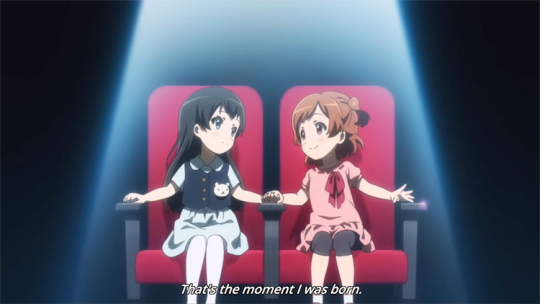
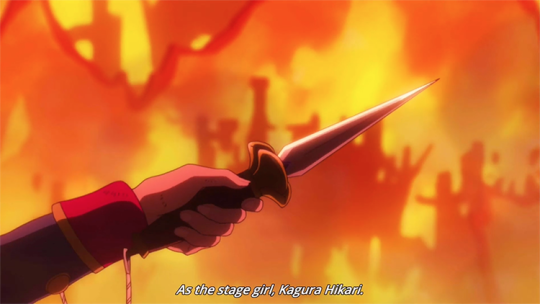
(3:05) The sparkle sounds are back again, right when she says, “That was the moment I was born. As the stage girl, Kagura Hikari.” And her hand isn’t even trembling anymore.
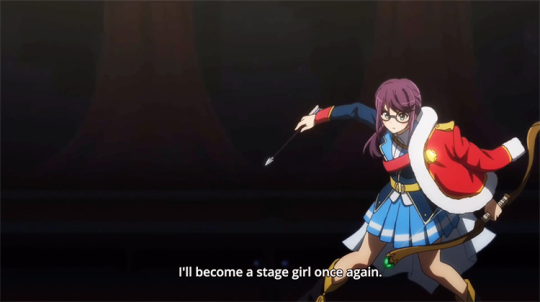

(3:24) Intensified Violins as The Chase to Become a Stage Girl Oh god, this is one of my favorite parts of the whole song. The music sounds like it’s chasing something. This “chasing” music, paired with the visuals of her very first Revue, shows that that was the moment she bounced back from her defeat. She started fighting again because she remembered why she wants to in the first place.
(3:52) it sounds like the music is being defeated again. This shift reflects Hikari realizing it is now inevitable that she would have to fight Karen in the auditions. We hear a loud bell too, as the visuals also took us back to reality, forcing us out of those dream-like flashbacks.

(3:59) I really love this because they are literally fighting on the last building standing. Hikari has that much foundation left, but it’s enough to keep her going. The scale composition is also good because you could really the tower, where the crown sits, as it looks down on Hikari’s burnt stage.
(4:16) Lullaby Music Sounding Like a Child’s Wind-Up Music Box Oh lord, another favorite part of mine. Notice how this is the only part of the song where the lullaby music is completely isolated. We are shown a flashback of that day where Hikari and Karen catch up on all those years apart from each other—the very day where Karen reminds her about their promised stage—at the same place they made it years ago.
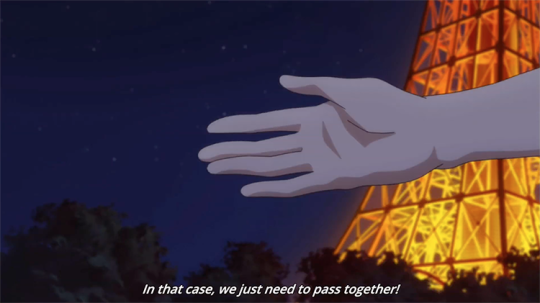
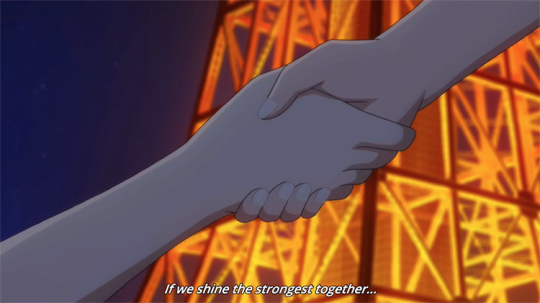

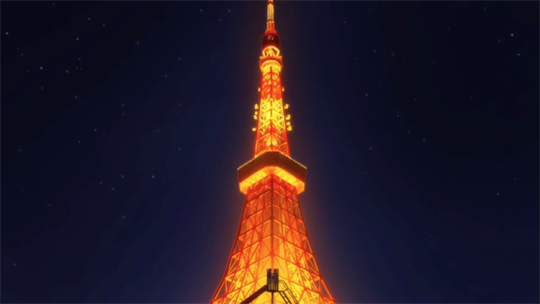
The lullaby music isn’t even a lullaby anymore—it’s a full-on children’s wind-up music box. And you know how you have to wind up its key all the way back, in order to hear the whole song? That’s exactly what happened on that day they caught up. They went back to the place they made their promise, as grown-ups. Karen reminded Hikari that if they can pass the auditions together, they could still stand on the same stage. And the very thought of that comforts Hikari so much, that she starts believing in it.
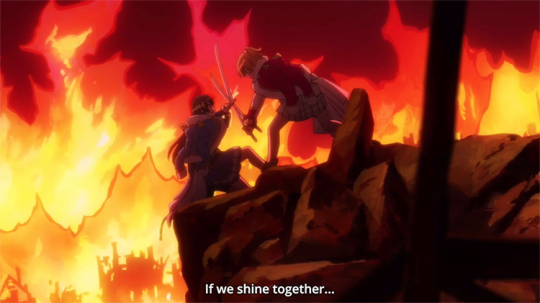
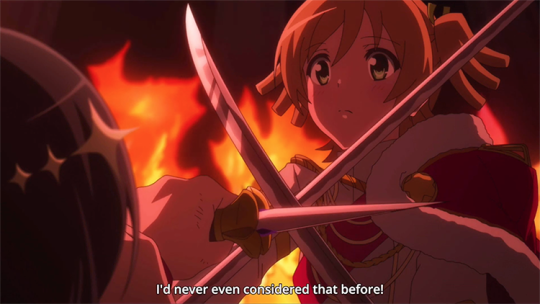

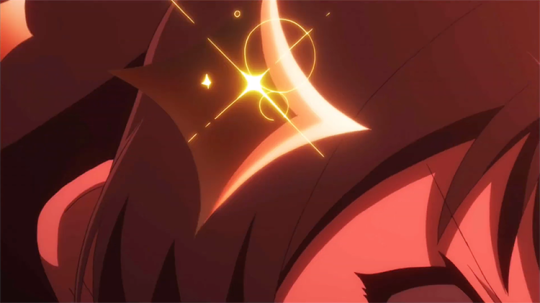
(4:39) Her hair pin—which Karen gave to her during the promised day—begins to shine, as she is empowered from all these memories.
(4:42) Alright guys here we go! The stage is shifting and so is Hikari’s weapon!. There is a lot happening, so let’s go over this one by one.
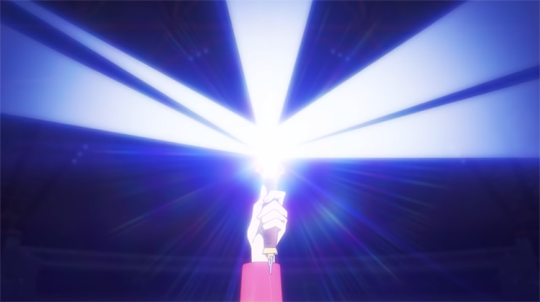

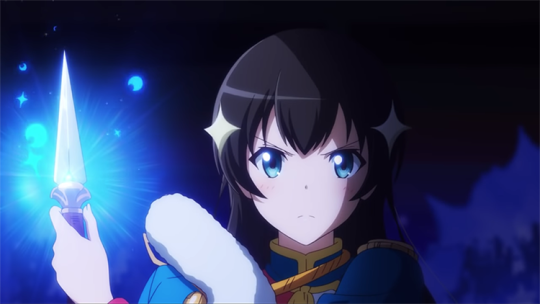
(4:51) Hikari’s Weapon, Part 1: the Eye Motif I like to think that the twinkling eye represents how much Karen has literally opened her eyes to the possibility of sharing the same stage together.
(4:57) The little “barriers”(/guard? quillion? Not sure what that part of a dagger is, and Googling can only go so far) weapon literally opens up too.

And having the lyric at this very moment be
Our dream unfolds
Is such impeccable timing.

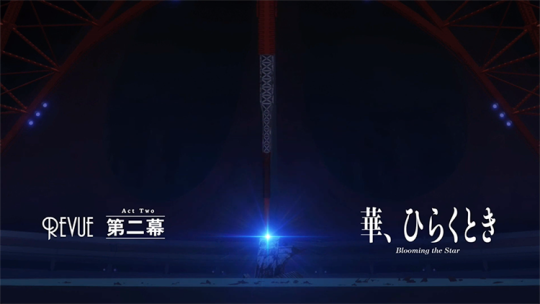

(5:01) Tokyo Tower Falling The Tokyo Tower falling into the water, causing a giant tidal wave, is how powerful Hikari’s promise is with Karen. All these memories she just reflected on elevated her emotions—represented by the water—so much that it’s overflowing.
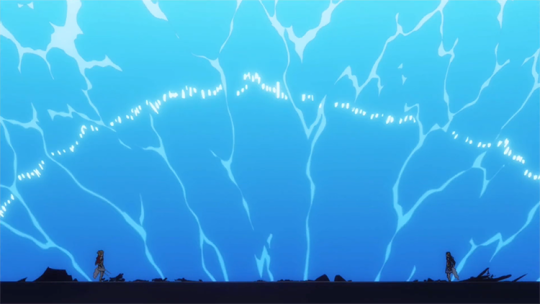

(5:18) Literally—who could forget these magnificent succession of frames. Who. Tell Me.
Before I talk about the water, I’d like to point out that Hikari and Nana are finally standing on the same plane. Meaning they now both have the same amount of power to give their all in the audition.
Anyway, let’s discuss what all this water means.
Water as Emotions As I’ve mentioned above, water is the element of emotions. The amount of water in this scene is how much emotion is contained and released within Hikari, as she remembers her drive to win.
Water as a Flowing Current and Tidal Wave Water is an element that flows—free to literally roam around anywhere it wants to be. At times it can be blocked by huge rocks or pieces of wood, but a tiny stream will eventually form, and will find its way out. Water also comes and goes in waves, especially in the sea. These two qualities of water shows how Hikari is able to bounce back in times where she has lost. Despite how many times her flow has been disrupted, or her tidal wave crashed—she will always make a come back.
Water as Cleansing Ultimately, the water is a metaphor for Hikari cleansing the toxic environment the burning stage had. Her memories with Karen are enough to get rid of it all—to wash off the destruction, and the doubt that they can’t win.
(5:25) Water as Life The lyrics here translated to English are along the lines of:
In the days when we were young The small seed that we planted then Has started to grow and bloom Guided by the stars
The seed is Hikari and Karen’s promise to perform Starlight together. That seed is being watered every time they remember to wear their hair pins, even when they got enrolled in performing art schools, and as they became actresses in their school’s stage plays, etc. Their plant has been growing until it started blooming today—because of their reunion. And because of Hikari finally warming up to the concept that they can win together.
And you know, the Act 2 of the Revue is literally titled, “Blooming the Star.”
The music in this sequence sounds like actual happy fairytale music again—but there’s a lot more instruments this time, making it feel grander than before.
(5:40) There goes the “chasing” music again, adding even more drama to the emotional quality of the song. All of this shows Hikari’s fierce determination to win.


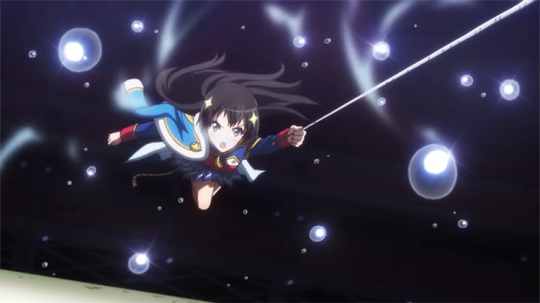
(5:45) Hikari’s Weapon, Part 2: the “Hook” as Her Perseverance No matter how far astray Hikari has gone during her auditions in London, she still managed to find her way back to her roots with Karen. Just like how the hook will continue to grip on the same spot, until one reaches that point after following the rope it’s attached to.
She also uses the dagger/hook as a swing, and you know how she literally swung back after being defeated? Yup.
Not to mention how great it is again that the lyrics are
I’ll reach my hand out towards you
is sung once she uses her newly transformed dagger/hook for the first time.


And with all of that perseverance, Hikari wins this round of the auditions.
The last thing I would like to point out are the last lines of the song:
Our bonds connected by the stars Can make a miracle happen
Hikari finally defeated Nana—who has won the auditions countless times beforehand. Now I consider that a freaking miracle. But guess who else won?
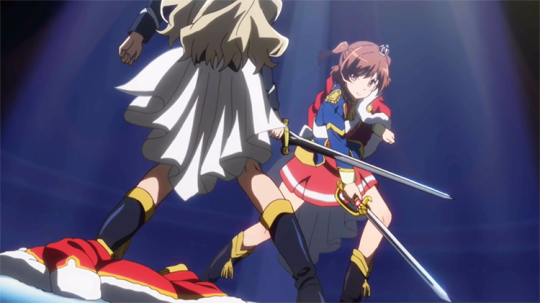
Karen. She won against Claudine too, the second-best one in the class. I would say that’s a miracle. Karen—the girl who jumped in—someone who wasn’t even supposed to be a part of the Revues in the first place. And she won because she holds her dream with Hikari so close to her heart.
And that ends this long analysis of Re: Create + the Revue of Solitude! If you made it this far, please know that I love you. And I hope all these small details will add to your experience in rewatching/listening to the song/scene again! Thank you for reading.
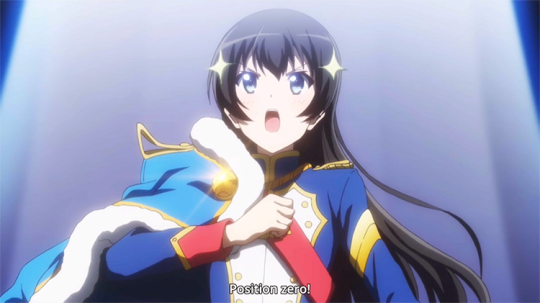
#hikari kagura#nana daiba#karen aijou#hikaren#revue starlight#shoujo kageki revue starlight#i can't believe i fucking did this#HIKARI IS NOT EVEN MY FAVORITE CHARACTER. FIRST OF ALL#i mean i love her but like#MIMORIN JUST DIDN'T HAVE TO GO SO HARD SINGING RE:CREATE OKAY#also if anything is grammatically wrong please spare me i haven't written a ~formal~ analysis in about 2 years#my analysis
51 notes
·
View notes
Text
Anon Who Is Angry about GITS
You are wrong about ghost in the shell, the original movie starts with the line : " In the near future: Corporate networks reach out to the stars ... advance of computerisation, however, has not yet wiped out nations and ethnic groups." - notice the statement with ETHNIC GROUPS. race still exists in ghost in the shell. it always has. motoko is a japanese woman. when the movie starts we see a blond woman that has been hacked, she is foreign and looks nothing like the films Japanese people.This idea that the prosthetic bodies in GITS have no race is nonsense. In Arise, we get to see what the american prosthetic bodies are like. Aramaki says that it's the US's go to body for diplomats working in japan. in almost every iteration of ghost in the shell, there is a distinct divide between the Japanese prosthetic bodies and other groups. not even to mention all the political and ethnic clashes that make up gits' story. race doesn't stop mattering just cuz you like whitewashing asians. Millennials -> labelers. Now i see why you think race doesn't exist. just because you are lucky enough not to face discrimination doesn't mean others don't. you realize that the people who advocate for their races rights don't want to be labelled either. the world has ALREADY labelled us. black people protest on behalf of black people because society treats black people badly. the protests are a response to how society treats us not the other way around. white privilege is a hell of a drug.No wonder you think whitewashing isn't an issue. because it doesn't affect you. Instead of complaining about how other people deal with systemic discrimination, why don't you educate yourself on why these "Labelers" are calling attention to these problems. I think you'll find that there's good reason for women, POC, LGBT people (and ppl in two or more of those groups) to bring attention to these things. It's important and we never asked to be singled out by society.
To the angry anon: Born in Mexico, raised in the US by my Mexican parents in the US, the fact that you think I don’t face discrimination is actually funny to me. First let me pose this question to you. If Motoko Kusanagi was played by a Latina women or a Black women, would you still say it was race erasure because the role wasn’t given to an Asian women? Or would you say it was diverse cast and great representation while the role still isn’t played my an Asian women? Double edge sword your argument is. You talked about “We never asked to be singled out”. First of all, when you group yourself and single yourself out from the rest, that’s how and why you get singled out because you singled yourself out. I never grouped myself with the LGBT community or the Latino community because I knew there was no point in doing so. Why? because my gender, sexuality and race don’t define me as a whole. I know who I am and I don’t need a group of people to decide who I am. I advocate for myself by talking to those around me and proving their prejudices wrong. I know I can’t change everyone’s way of thinking but if in all of the conversations that I have with people, they some how realize that their prejudices are incorrect.
In the end I am who I am, my identity is mine alone. I don’t need to be in the LGBT community to be LGBT, I don’t need to be in the Latino community to be Latino. I assimilated to my surrounding while not forgetting my roots. I speak Spanish fluently but my first language is English. I know my culture and traditions but I celebrate those is my home. I am trans but I don’t have to declare it to every person I meet. I am pan but I don't need to tell every person I like. I present my person, my identity as a whole and in portions. I am HUMAN, nothing more nothing less than the next person.
Now to get back to GITS. GITS offers these ideas if humanity because Motoko is struggling with her own humanity. Through out the movie it isn’t about if she’s Japanese or Asian, it’s about wether or not she’s human. She doubts her own soul/ghost. She doubts she’s human because her only form of knowing she is human is because she’s treated as a human. The entire movie isn’t about the country she resides in, it’s about her humanity. Then think about being a cyborg, you have the freedom to change your exterior look. GITS SAC provides a good example when Paz has to fight that crazy lover of his who wanted to high jack his identity by being like him physically. GITS 2 Innocence, Kim has literally has taken a look of a puppet. The Ghost in the Shell Manga, there is a character who is just simple box with wheels and some arm extensions, he literally incased his brain in a black box. And the first scene is the scene with her dropping down from the tower to kill the man who was trying to take a programer out of the country. then it show’s the iconic scene of Motoko being built, then Aramaki is talking to the Minister of Foreign affairs, then it’s the blond woman. Question- Everyone who is blond is automatically white?
0 notes
Text
Okay, I have calmed down enough after reading Aftermath: Empire’s End that I can address the bit that really got to me.
TL;DR: the entire “Contigency” business is based on an extended chess metaphor and... I have questions.
Previously, we have learned that a Jakku orphan named Galli Rax stowed away on Palpatine’s Space Yacht so he could get away, only to be caught by Palpatine. Palps told the kid that he had two choices: die, or go back to Jakku and make sure no one stumbled across the Mysterious Thing (”the Observatory”) Palps was constructing out in the desert. Galli chooses the latter, and Palps sends him back to Jakku and Galli does his thing. Ten years later, Palps shows back up with the space yacht to compliment Galli on a job well done and take him away.
O.... kay. I’m not sure how Palps was able to ensure Rax would keep his end of the bargain. Sure, he has a supervisor Yupe Tashu and a bunch of droids, and I suppose they could have killed Galli, but... there didn’t seem to be anything stopping Galli from running away? I doubt even Palps would have bothered to stalk one kid just to prove a point, but it just seems really weird from Palpatine’s perspective to be so hands-off.
Anyway, so the first thing they do in their Big Reunion is Palps teaches him how to play chess. And I don’t just mean Thinly-Disguised Space Chess as a stand-in for the real thing, I mean actual chess.
Here’s the passage that made me start to howl and gibber from a world-building perspective:
“It’s a very old game. Shah-tezh, in this interation, thought over the eons I have seen it spawn many variants. Dejarik. Moebius. Chess. In most of the iterations the core mechanism remains.”
To be clear: this is Palpatine talking. What the hell does he mean by “over the eons I have seen”? That’s not the sort of thing you say if it’s something you know from a book or a story, that’s what you say if you’ve personally experienced it. Is Palpatine really that old?? If so, this is HUGE, absolutely earth-shattering bombshell from a world-building perspective. Is it ever followed up on? Not that I can tell.
What. The. Actual. Fuck.
(To be fair, I’m not against this, per se, but I just... feel like if it was important.... it should be relevant.... and not name-dropped once and never mentioned again? Like, it matters? AAHHHHHHHHHHH.)
The other thing that made me scream, is, of course, the fact he comes right out and says it’s Chess In Space, which.... While I have used “holo-chess” as a synonym for “dejarik” in my fics, and Wookiepeedia says “holochess” is an accepted synonym for dejarik in nu!canon, this particular passage reads weirdly to me because it implies that chess as we know it on Earth is a separate but related game to dejarik, not just another name for the same game. And I... have questions about that, just like I would if “poker” suddenly appeared in the GFFA lingo along with “sabacc”.
{Also, I just want to note that the Persian word for chess is shatranj. Per the “History of Chess” article on Wikipedia:
Players started calling "Shāh!" (Persian for "King!") when attacking the opponent's king, and "Shāh Māt!" (Persian for "the king is helpless" – see checkmate) when the king was attacked and could not escape from attack. These exclamations persisted in chess as it traveled to other lands.
This isn’t the first time real-life details have migrated into Star Wars - “Tatooine” is named after a location in Tunisia, and the Lars’ farm is located in the “Great Chott” which actually exists on Earth.... but still. I’m just saying.}
And again, this is probably me being stupid and petty about Details That Don’t Matter, except that the one is actually huge from a plot and thematic perspective, so it’s hard not to get tripped up on it.
Anyway, so Palps instructs Galli in the intricacies of shah-tezh, and it all boils down to one thing: “without the Imperator, the demesne cannot survive”.
And That’s the reason why Palpatine has to personally make sure the world burns after his death, because it means that his Empire has completely failed if he dies and deserves to be punished. O.... kay then.
(Granted, Palpatine is a crazed narcissist, but... there’s like no way this makes logical sense, right? And Rax doesn’t even think “oh, that’s insane, but I have to agree to stay alive”. Even at this juncture, when he barely knows Palpatine at all, he’s completely swallowed the Kool-Aid. Which is odd because he’s very skeptical about other things.)
Anyway, Palps repeats it because it’s his guiding principle: “If an Empire cannot protect its Emperor then that Empire must be deemed a failure. It collapses not only because its central figure is gone, but because it must not be allowed to remain.”
He’s so incensed he nearly strangles Galli, but then he relents, and says Galli is “the Contigency” and if he fails, he’ll be replaced, because literally, “destiny”. Then they go watch opera, because Palps hasn’t found anyone to watch opera with him since that one time with Anakin and... Vader isn’t into that, lol.
(The problem with making opera Galli’s thing is that ALL OF THOSE SCENES ARE FLASHBACKS or referred to in passing in the narrative rather than viewed directly. So we don’t see him poised at the opera, plotting, the way Palps did in ROTS, or contemplating art like Thrawn does. So it’s easy to forget that he has this quirk. Also, it makes him feel like a Thrawn knock-off. But I do like that it’s canon that he’s just the Biggest Drama Queen ever, though.)
I’ve said this before in earlier rants, but to repeat: I do not see Palpatine as having the relative humility needed to even consider his own death seriously. in ROTJ, he acts 100% confident that he’s gonna come out the winner. So to come up with an entire elaborate plot, on the off chance that someone might off him seems just... kinda OOC?
Sure, he’s the type to have wheels within wheels and all kinds of schemes going on simultaneously, but... this one involves placing a lot of trust in Galli Rax going along with the script, and I just... don’t get why he would assume Rax would automatically go along with it, or be able to. There are just so many variables that the novel doesn’t seem to address and it’s just hard for me to imagine Palpatine doing this without making other/additional Contigencies, not just one.
Anyway, so it turns out “the Contingency” is to lure both the Imperial remnant and the New Republic fleets to Jakku and then literally blow the entire planet up to take everyone out at once, while a handful of specially chosen loyalist ride off in Palpatine’s Space Yacht for the Unknown Regions to form a new Empire. Which... okay, sure, why not. In theory, this sounds pretty cool and it involves all of Palpatine’s favor tricks, including a planet-destroying superweapon.
Where it actually breaks down is in the details, of course. And Palpatine is still dead, of course, so it does shit-all for him, except for some vindictive satisfaction while still alive, I guess.
(And if he is planning on coming back, it seems weird to burn down the house you plan on re-occupying later? I guess? *shrugs*)
Anyway, it turns out that Palpatine has a whole network of Observatories, where he does all kinds of secret, evil things:
Palpatine began establishing the Observatories before the start of the Galactic Empire, infusing each with purpose: Some were meant to house ancient Sith artificats, others designed to host powerful weapons designs (or the weapons themselves), others still meant as prisons harnessing the lifeforces of those captured within for a variety of strange purposes.
(which, given that the Ashmead’s Lock prison on Kashyyyk is powered by its inhabitants’ life force a la The Matrix, strongly suggests that it, too, is an Observatory, although the book does not say that directly and canon will probably never mention the energy-harvesting thing again despite ALL OF THE QUESTIONS THE EXISTENCE OF SUCH TECH RAISES.)
I’m okay with this passage, because it means that the Maw Installation, the Eye of Palpatine, and Wayland are all part of this system. It feels very much in-character. However, only Jakku is part of the Contigency, at least according to Galli, but--tbh, I kinda doubt it, because when have we ever known Palpatine to tell the truth? Or have Only One Plan?
Anyway, for decades, the Observatory computers have been plotting a route through hyperspace into the Unknown Regions. (I thought this was something only Jedi could do, since they were supposedly hard-core Space Navigators? Otherwise, what was even the point? *shrugs* Why do you even need a “Sith Wayfinder” anyway? *cough cough*) Then there’s an obligatory Thrawn reference, since Thrawn is canon, but Rax is pretty dismissive and says that the only reason Palps tolerated Thrawn was for his secret navigational insights into the Unknown Regions.
So if Palps loses his original demesne, he’s just gonna go conquer the Chiss or something? Except he can’t, because he’s dead, so what ever. I don’t even know, okay? Does anyone know what happened to Thrawn or the Chiss post-OT in the Disney ‘verse??
Anyway, Palps is convinced there’s something in the dark side waiting for him out there, which Galli is dismissive of. You’d think a guy who had literally been Force-choked would be more accepting of this instead of assuming it was just wishful thinking, but okay then. This is pretty clearly meant to be an obvious Snoke reference, which gets wonky with the TROS retcon that Snoke was a clone-puppet of Palpatine the entire time!
Anyway, Rax gets Yupe Tashu all geared up with Secret Evil Sith Gear and a Magic Kyber Crystal and tosses him into the planet’s core, and it starts the self-destruct process. Except it doesn’t because Rae Sloane kills Rax at the last moment, puts a stop to it, and steals the yacht full of feral children and flies off into the sunset to carry on Rax’s master plan because the New Republic destroyed the Imperial fleet while she was distracted and she apparently is tired of all this shit? Okay.
Anyway, she makes a deal with Armitage Hux that she’ll keep Brendol from abusing him if he keeps the feral kids from attacking her, and apparently it works out. This is supposed to be the origin of the First Order, and I guess they find Snoke or something, but none of the details are ever explained in any material I can find, so.... *shrugs*
I just really don’t understand how the First Order can be functional under the conditions herein described and how it logically evolves from This One Ship to a massive, disciplined force capable of wiping out the New Republic.
So I finished the book and... was kind of mad, because it just felt like a complete waste of my time. Overally, this whole thing just seems like a lot of build-up that doesn’t go anywhere, and provides weird backstory that only raises more unaddressed questions for things that really didn’t need it.
also, it’s darkly amusing to me that this book comes out saying, “yup, the ST is a literal game-board reset of the OT, and Palps fully intended for it to be that way, even though we at Disney had no plans to bring him back as a villain at first” and I just... well, props for honesty, I guess?
anyway, the whole thing is a mess from a world-building perspective, and even though Star Wars is Fake and In Space, I just get grumpy when things don’t line up, especially since that was supposed to be one of the major selling points of this new canon in the first place.
3 notes
·
View notes